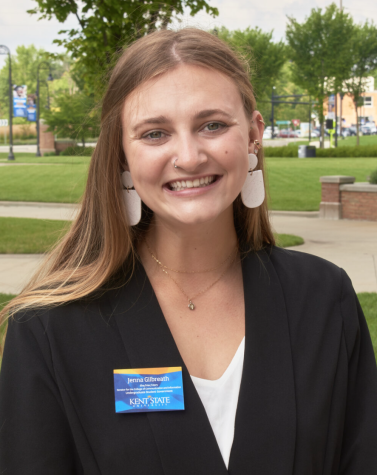Getting to know USG
March 4, 2023
Undergraduate Student Government stands out among student groups through its commitment to creating a better campus for students.
President of Undergraduate Student Government Jenna Gilbreath became interested in USG because it was an opportunity to make a difference in students’ lives.
”What drew me to the organization was the fact that we are students helping serve the student body,” she said. “Working with students to help make change on our campus.”

She describes USG as the liaison between Kent State students and faculty and staff members.
Gilbreath also described USG’s new advocacy tool kit which is live on USG’s website. The program comes from Kent’s history of student-organized protests and aims to provide resources to make change.
Another tool USG provides students is “Change in a Flash.”
“If students have a campus change project or something they think should be done differently here on our campus they can submit an idea to that and they’ll get connected with a USG member that knows somebody perhaps on our faculty, staff or administration that oversees that area,” she said.
Gilbreath stressed the importance of working together between USG, students and Kent administration.
“Everybody has a great idea. No one person has all the answers,” she said. “There’s no way I can say ‘I have the answers or the administration has the answers.’”
USG also aims to give back to students through its allocation committee. In her sophomore year, Gilbreath began on USG’s allocation committee. She said around half of the USG budget goes toward the allocation committee.
This money is used to provide students with opportunities to attend various conferences individually or with their student organizations. USG covers any registration fees, trouble fees or hotel costs for students.
“We really want students to be able to expand their experience outside of the classroom so we help students do that financially,” she said.
Gilbreath then discussed Care About Kent, a program USG offers for student organizations to receive operational funding. Student organizations can choose which service event to complete.
The service events include a day of action, in which members of a student organization volunteer for the department Community of Engaged Learning, leadership training and diversity equity inclusion training.
The service events require three members to attend to receive a hundred dollars in funding for their organization.
Gilbreath helped expand Care About Kent to incorporate options two and three because she knows from her experience starting Thirst Project Club the difficulty of starting clubs at Kent.
“It was really hard to do things, have events and incentives for people to be there because we did not have any money,” she said.
USG also aims to provide funding for members’ events with Student First Funding. Examples of this funding being used include senators of colleges putting on events with their colleges to get feedback from students.
“We want that money to get back to as many students as possible in order for it to be a beneficial experience for them which is why we call it Student First Funding,” she said.
When asked what other aspects of USG are important for students to know, Gilbreath mentioned various USG positions.
“We have appointed positions and a lot of these are senators at large positions like a senator for diversity, senator for resident halls, senator for international students, senator for athletics and senator for off-campus and commuter students,” she said.
She described how these positions are chosen.
“All of those are appointed positions as well as our chief of staff. After elections, we open up applications for those and we go through an interview process and it’s a matter of the next student body president in the cabinet deciding who gets those positions,” Gilbreath said.
For those who want to learn more about the current candidates for the USG election, the president, director and senate debates will be held March 16 at 6 p.m. in the Governance Chambers.
Adriana Gasiewski is a reporter. Contact her at [email protected].











